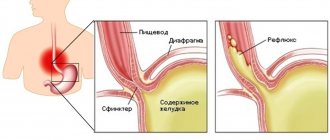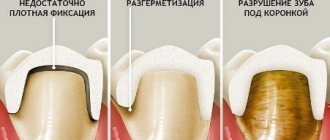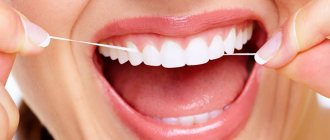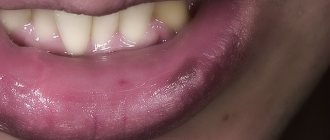Tooth extraction: swelling
Tooth extraction is a difficult operation that traumatizes the tissue surrounding the tooth. Therefore, it is not surprising that unpleasant consequences occur after tooth extraction: the most common of them is swelling. Patients often complain that after tooth extraction, the gums become swollen, swelling of the cheek or a slight gumboil appears. This is caused by partial destruction of the soft tissue around the tooth. This is unpleasant, but if the tumor is small, it goes away on its own in 2-3 days. To relieve swelling after tooth extraction, ice can be applied to the cheek for about 10 minutes. If the swelling has not gone away after a day, apply heat. Keep the heating pad for 20 minutes, then take a break for 10 minutes and put the heating pad back on.
Sometimes swelling can be caused by an allergy to the anesthesia. In this case, histamine, an antiallergic drug, will help. But if the swelling increases, then it may be a sign of inflammation that has arisen after tooth extraction. In this case, you should immediately consult a doctor.
Pain after tooth extraction
Another common complaint is that after tooth extraction, the gums, adjacent tooth, jaw, and throat hurt. As a rule, these are common symptoms after a traumatic procedure. They are caused by damage to the periodontal tissues and nerves, which goes away on its own after a few days. For example, if a temporary aching pain appears after tooth extraction, this is normal. To relieve discomfort, you can take painkillers. But if the pain intensifies, it is still worth visiting a doctor.
What causes the taste of blood in the mouth?
Until now, the human body remains a mystery. Despite this, we can safely say that all processes occurring in the human body have a certain pattern. Diseases and discomfort do not appear without specific reasons. For example, a runny nose begins as a result of pathogens entering the nasopharynx. Why does the taste of blood appear in the mouth and what is it connected with? There are several answers to this question. Anyone can feel and recognize the taste of blood in the mouth. This unpleasant metallic taste is difficult to confuse with something else. The characteristic taste is explained by the presence of iron in the blood, a trace element that is a component of hemoglobin. The constant feeling of the taste of blood in the mouth is a serious pathology that is quite common among patients. People suffering from this disease cannot fully taste the taste of the food they eat, and this negatively affects their appetite and, as a result, leads to weight loss, dystrophy and the development of serious diseases. If you feel the taste of blood in your mouth, then you need to find the cause of this phenomenon. It can be minor, or it can be serious and very dangerous. In any case, you shouldn’t ignore this situation. What are the reasons why you may taste blood in your mouth? The most common cause of this unpleasant taste is diseases of the oral cavity and teeth. To correctly determine the cause and find out whether the taste of blood is associated with diseases in the oral cavity, you should visit the dentist's office. Perhaps this is stomatitis - a disease that is manifested by the formation of white sores. At first they cause severe pain, and then begin to bleed. Even more serious is the cause associated with gum disease. In this situation, it is necessary to seek the help of a specialist as soon as possible and begin treatment. Bleeding gums are the main symptom of periodontal disease. If no dental disease is detected, you should pay attention to your breathing. If inflammatory processes occur in the nasopharynx and breathing is difficult, then the taste of blood may be felt. Another cause of such sensations may be medications or nutritional supplements. You should analyze everything you took in the last 14 days. It is possible that the vitamins you take are enriched with a large amount of iron or that such a trace element is present in the medications and supplements you take. If you discover that you are taking such drugs, you must temporarily stop taking them. If the taste disappears, then the reason why the taste of blood appeared has been discovered. A metallic taste may also be felt when breathing through the mouth when saliva dries quickly. In such a situation, dehydration of the oral cavity causes a specific taste. This is why asthmatics constantly taste blood during attacks. In addition to all of the above, the taste of blood in the mouth can be a signal of the appearance of diseases such as diabetes, stroke, heart attack, kidney failure, cancer. Also, internal bleeding should not be ruled out. To get rid of the unpleasant feeling of a metallic taste in the mouth, you need to find out the reason why it appeared and then eliminate it. If the problem is related to teeth, then you should consult a dentist and undergo a course of treatment. If your throat is dry, you need to drink water. If the taste of blood in the mouth does not go away for a long period, then it is necessary, without wasting precious time, to visit a medical facility. Self-medication and waiting for everything to go away on its own can end badly in such a situation.
Bleeding after tooth extraction
Immediately after a tooth is removed, there is bleeding from the socket. This is quite normal, since blood vessels rupture during surgery. In this case, the doctor will provide you with the necessary assistance. But sometimes bleeding occurs a few hours after surgery. To stop the bleeding yourself after tooth extraction, apply a small gauze swab to the hole and lightly bite it. After 15 minutes the blood stops flowing. But if the bleeding does not stop for a long time, you should consult a doctor.
Pus after tooth extraction
Suppuration of the socket and periodontal tissues is caused by their infection. It can happen for several reasons. Firstly, if you did not follow the dentist's instructions regarding individual oral hygiene after surgery. Secondly, the cause may be a tooth fragment remaining in the tissues after removal. Thirdly, there is a high risk of suppuration after a complex wisdom tooth extraction, for example. If the inflammation is not treated in time, then some time after removal, suppuration, a fistula on the gum, and even a cyst may appear. If pus appears at the surgical site, consult a doctor. He will find and eliminate the cause of the inflammatory process.
Symptoms for an urgent visit to the dentist
When such an unpleasant symptom as pain and bad breath intensifies, the temperature rises, the gums swell, and dental surgery may even be required. It is important to see a dentist on time.
- The doctor will carefully examine the oral cavity and the surgical area.
- A small spoon is used to diagnose the hole.
- If alveolitis develops, special therapy is prescribed. First, anesthetics are introduced, then plaque and pathogenic microbes are removed.
- Then the wound is treated with an antiseptic, and the necessary medications are applied.
- Stitches may be needed.
You should contact the dentist when the gum tissue is swollen, you feel severe pain, your cheek and neck are swollen. In such a situation, pus collects in the wound area. The dentist prescribes rinsing, disinfection procedures, painkillers, and antibiotics. With severe tissue injury, an abscess may develop. At risk are those patients who do not follow the doctor’s recommendations. Remember that timely contact with a doctor is the key to quick treatment.
Dry socket after tooth extraction
A blood clot should remain in the socket after surgery. This is a very important part of the healing process. This clot protects the bone and nerve endings and serves to form bone tissue after tooth extraction. Therefore, you should not rinse your mouth for a day after the procedure and eat hot food - this will help the clot dissolve. But sometimes it does not form, and a dry socket appears.
Dry socket is considered a complication. It most often occurs after complex removals accompanied by significant trauma. If there is no blood clot, then the hole after tooth extraction hurts, and sometimes it seems that the ear also hurts. Often there is an unpleasant taste in the mouth. The consequence of a dry socket after a traumatic tooth extraction can be inflammation of the gums or alveolitis. Therefore, if you experience acute pain in the socket, consult a doctor immediately. He will place a tampon with a special anti-inflammatory gel on the hole. Tampons are changed until healing begins.
Getting rid of unpleasant odor
If you can’t visit a doctor within the next few days, you can try to remove bad breath on your own. The measures are aimed at reducing the spread of pathogenic flora in the mouth. Hygiene measures are carried out longer than the required time - 5-7 minutes instead of 3-4. Particular attention is paid to the interdental spaces, where the greatest amount of plaque accumulates. It is recommended to use brushes, irrigators or dental floss along with the brush and paste. Careful hygiene prevents the spread of infection deep into the soft tissues of the alveoli.
After each meal, the mouth should be rinsed with antiseptic solutions. This is necessary in order to prevent a foreign object from entering the wound. Solutions can be purchased at a pharmacy or prepared independently at home. Preference is given to herbal solutions or plain boiled water.
Alcohol tinctures are not used to rinse the mouth after tooth extraction, as they can cause burns to damaged tissues. Decoctions can be prepared from chamomile, calendula, mint or lemon balm
If a putrid odor appears from the mouth, it is recommended to stop consuming protein foods (meat, fish). Preference is given to fresh vegetables and fruits. After each snack, chew gum.
During hygiene procedures, the back of the tongue is also cleaned, since the vast majority of pathogenic microorganisms are concentrated on it. Before visiting a doctor, you can soak a cotton swab in an antiseptic composition and apply it to the problem area. In case of severe bleeding, a tampon with hydrogen peroxide is applied to the wound area. Lotions using novocaine or lidocaine help reduce the intensity of pain.
Medicinal solutions for rinsing
To prevent foul odor from the mouth after tooth extraction, the following antiseptic compositions should be used:
- Furacilin solution. Prepare the product yourself: dissolve 2 tablets of the drug in 1 glass of boiling water and leave until cool. The product has a powerful anti-inflammatory and antiseptic effect. Furacilin is recommended for purulent complications and severe inflammation of the gums.
- Chlorhexidine solution. Prevents the development of purulent lesions.
- Miramistin. It eliminates bad breath well and prevents the formation of pus in the socket.
Rinse your mouth carefully so as not to wash the clot out of the hole. It is advisable to simply hold the antiseptic solution over the problem area. Measures to treat the oral cavity are carried out 24-48 hours after extraction. At least 6 hours must pass between procedures. Avoid rinsing your mouth if there is a cotton swab soaked in an antiseptic in the hole. You should also not remove the tampon yourself.
When providing emergency care, it is important to remember that some home procedures can be hazardous to health. Many patients rush to use saline or soda solutions after tooth extraction. Doctors speak out against the use of such drugs. The components disinfect the hole well, but also contribute to the destruction of the clot. Illiterate self-medication can only aggravate the situation. The well should not be touched after removing the element, even if the clot is dark in color and has a bad smell.
Traditional medicine is used in combination with medications. List of effective recipes to eliminate bad breath from the mouth:
- Sage decoction and oak bark: 2 tbsp. l. of herbal ingredients, pour 200 ml of boiling water and leave until cool. Use hot solutions to treat the mouth. Warming up stimulates the activity of pathogenic bacteria.
- Fresh leaves of golden mustache. The leaf of the plant is crushed until the juice appears and diluted in a 1:1 ratio with boiled water. The medicine is used twice a day after tooth extraction.
- Eucalyptus. It not only freshens breath, but also reduces the intensity of inflammatory processes.
If no results are observed from home treatment within 2-3 days, then you should urgently consult a doctor. Do not forget that emergency measures are considered only as temporary methods for eliminating unpleasant signs after tooth extraction.
Alveolitis after tooth extraction
This is a serious complication caused by tooth extraction, which has several causes. This may be the presence of chronic inflammation of the tissues around the tooth - periodontitis, or a dry socket. In addition, alveolitis occurs if, after tooth extraction, a dental fragment remains in the tissues. All these factors cause infection of the hole and the development of its inflammation. 1–3 days after tooth extraction, pain occurs, followed by a specific smell from the mouth. Then these symptoms intensify, the hole becomes covered with a gray coating, and it becomes impossible to eat due to severe pain.
In this case, only a doctor will help you, who will carry out the necessary treatment and clean the hole from infection. Do not self-medicate under any circumstances - alveolitis can develop into periostitis (inflammation of the periosteum), causing an abscess and phlegmon.
Painful sensations after the removal procedure are unpleasant, but inevitable. Remember, if these sensations intensify, then in this case, complications after tooth extraction should be treated by a specialist. Do not delay visiting the dental clinic, dulling the pain with analgesics. Correct and timely treatment will help you avoid more serious complications.
Stomach problems
The appearance of bitterness in the mouth also indicates stomach problems. It is often complicated by additional indications: bloating, nausea, heartburn, stomach pain, belching and a yellow-white coating on the tongue.
What to do
- Restore proper functioning of the digestive organs: remove heavy fatty and smoked foods, spices, salty and fried foods from the diet.
- Take medications that normalize the functioning of the stomach and intestines (as prescribed by a doctor).
Attention!
Bitterness in the morning, together with pain in the right side, more often indicates problems with the liver and gall bladder, short-term and after meals - about problems with the duodenum and gastrointestinal tract, hormonal disorders.









